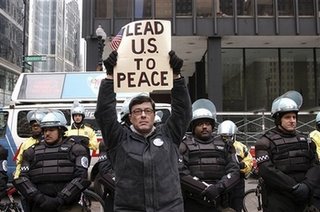Taken from The Times, UK, 29.11.06
By Tom Baldwin
The death of Malachi Ritscher was reported by a local television station as just another frustration for commuters driving into Chicago one morning when police were told that a statue was burning and slowing-up traffic along the Kennedy expressway.
This was not how the anti-war activist had envisaged media coverage when on November 3, he set up a video-camera and a small sign reading “thou shalt not kill” next to Chicago’s Flame of the Millennium sculpture. He then doused his body in petrol and set himself on fire.
Mr Ritscher, 52, had even written a lengthy “mission-statement” on one of his many websites, saying: “If I am required to pay for your barbaric war, I choose not to live in your world. I refuse to finance the mass murder of innocent civilians, who did nothing to threaten our country.”
There was a passage on the midterm Congressional elections taking place on November 7, which he perhaps hoped to influence, as well as some speculation about how others would judge him: “Maybe some will be scared enough to wake from their walking dream state — am I therefore a martyr or a terrorist? I would prefer to be thought of as a spiritual warrior.”
Like the Czech student Jan Palach in 1969, or Buddhist monk Thich Quang Duc in South Vietnam in 1963, he had chosen the most dramatic and agonising form of suicide to draw attention to his protest against the Iraq war. “What has happened to my country,” he wrote, that it is “more concerned with sports on television and ring-tones on cell-phones than the future of the world?” What Mr Ritscher had not reckoned with was that people would continue to be more concerned with TV sport — and getting to work on time — as they drove past his flaming body. It was not until the day after the election that the Cook County medical examiner got round to identifying the corpse, charred beyond recognition. But it was at this time that a small article appeared in the alternative newspaper, the Chicago Reader, about his “apparent suicide”. Soon, its website was being inundated with hundreds of messages from people who knew him from the city’s jazz scene, fellow anti-war activists and family members.
The picture which emerged was that of a lonely, troubled man, who had struggled with bouts of alcoholism and depression, but also one with an obsessive, cogent mind who cannot easily be dismissed as a victim of mental illness.
“He believed in his actions, however extreme,” his younger brother, Paul Ritscher, wrote. “He believed they could help to open eyes, ears and hearts and to show everyone that a single man’s actions can effect change in the world.”
Wednesday, November 29, 2006
Anti-War Protester Burns Himself To Death In Vain
Subscribe to:
Post Comments (Atom)





No comments:
Post a Comment